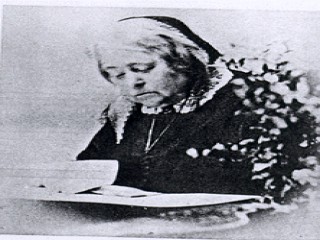
Elizabeth Peabody biography
Date of birth : 1804-05-16
Date of death : 1894-01-03
Birthplace : Billerica, Massachusetts, U.S.
Nationality : American
Category : Famous Figures
Last modified : 2011-04-02
Credited as : Educator and author, language kindergarten,
Elizabeth Palmer Peabody, an American educator, author, and prominent member of the New England intellectual community, promoted the new kindergarten movement in the United States.
Elizabeth Peabody was born in Billerica, Mass., on May 16, 1804. Her sister Mary married educator Horace Mann, and her sister Sophia married author Nathaniel Hawthorne. Elizabeth's early education was at her mother's schools in Salem and Lancaster, Mass., where, although still a child, she did much of the instruction. This experience nourished her sense of mission and reform.
Beginning in 1820, Peabody made a number of unsuccessful attempts to establish her own schools, meanwhile serving as unpaid secretary to William Ellery Channing, the Unitarian leader. Her Reminiscences of William Ellery Channing, D.D. (1880) discloses the extensive influence of Channing on her career and educational thought. In 1834 she became Bronson Alcott's assistant in the famous Temple School in Boston, described in her Record of a School (1835). When it closed, she opened a bookstore and publishing business which provided an outlet for the early efforts of Hawthorne and Margaret Fuller. The store endured for 10 years, becoming a transcendentalist salon. In addition, in 1842-1843 she published the Dial, a journal of transcendentalist opinion.
Peabody returned to her first interest, education, in 1845. Although teaching, she found time to write grammar and history texts and, in 1849, to establish a short-lived literary journal, Aesthetic Papers. She also toured to promote the study of history and wrote the Chronological History of the United States (1865).
Increasingly Peabody's attention turned to the education of the very young, and from 1860 to 1880 she devoted herself to organizing kindergartens along lines established by the German educator Friedrich Froebel. Her purpose was to develop children "morally and spiritually as well as intellectually" and "to awaken the feelings of harmony, beauty, and conscience" in the pupils. Her efforts resulted in a publicly supported kindergarten in Boston in 1860, the first in the country. But uncertainty about the institutions's effectiveness led her to make a pilgrimage to Germany in 1867 to observe Froebel's disciples. After returning she furthered the cause through public lectures and, from 1873 to 1875, as publisher of the Kindergarten Messenger.
Peabody's remaining years were absorbed in championing Native American education, lecturing in Alcott's Concord School of Philosophy, and writing. Despite failing vision she finished Last Evening with Allston (1886), a tribute to the Boston painter and poet Washington Allston, and a collection of her earlier essays. She died on Jan. 3, 1894.
















